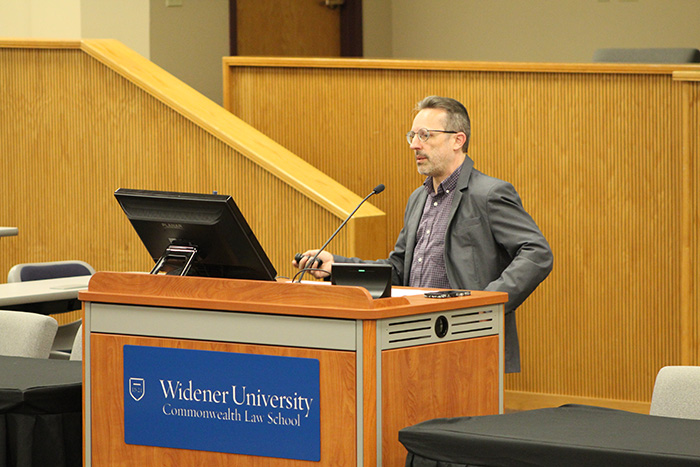
Guest Speakers Give First-Year Law Students Rare Look Inside Landmark U.S. Supreme Court Case
Widener University Commonwealth Law School students gained unique insight into a pivotal moment in First Amendment law when two seasoned litigators visited their class to discuss their firsthand experience with Garcetti v. Ceballos, a landmark U.S. Supreme Court case on public employee speech.
Scott Caron, director of academic success at Widener Law Commonwealth, and Jin Choi, a former colleague of Caron’s in private practice, spoke to the class of first-year law students about their work on the case, which shaped national precedent on when constitutional protections are afforded to government employees.
“This is one of the most significant free speech cases for public employees in recent history,” Choi told the students. “And we had the unique opportunity to be involved from the very beginning through oral argument before the Supreme Court.”
Professor Amanda Sholtis, who teaches the legal methods II class, said Caron offered to speak with the students after learning they had an appellate brief assignment centered on public employee speech and the First Amendment. “Since Garcetti is a seminal case in this area, he volunteered to speak with our class along with Jin. I immediately accepted his offer because I thought it would be a wonderful experience for our students,” she said.
The case arose when Richard Ceballos, a Los Angeles County prosecutor, alleged that he faced workplace retaliation after writing a memo questioning the validity of a search warrant. The legal question at the heart of the case was whether public employees are protected by the First Amendment when speaking in the course of their official job duties.
“All our students read Garcetti for their work on their appellate briefs,” Sholtis added. “Scott and Jin’s presentation was a way to bring this case to life for them. It shows students what an impact attorneys can have on the law itself.”
Choi, who has practiced law in California since 1995, led the litigation in the trial court and later before the U.S. Court of Appeals for the 9th Circuit, along with a former firm partner. He walked students through the early procedural steps, including the district court’s decision granting summary judgment in their favor—later reversed by the 9th Circuit.
“One of the key moments that got us to the Supreme Court was a concurring opinion from a 9th Circuit judge,” Caron said.
The judge explained that precedent in that area of law was problematic and ripe for review. The insight provided a hook the lawyers needed in their push to get the case before the nation’s highest court.
First-year student Gabrielle Hubbard said the presentation offered a candid look into the realities of high-stakes advocacy. “It was really interesting to hear from someone who has reached a point in their career that many of us can only imagine,” she said. “Attorney Choi talked about how nervous he was, despite how well he knew the case. It was reassuring to hear that even seasoned lawyers feel impostor syndrome—but also that the skills he learned in law school helped him succeed at the Supreme Court.”
In a 5-4 decision issued in 2006, the Supreme Court ruled that speech made by public employees as part of their official duties is not protected by the First Amendment, establishing a bright-line rule that continues to guide courts today.
“Students got the opportunity to hear how rare it is for a case to get to the Supreme Court and how much work the attorneys do to litigate a case from start to finish,” Sholtis said. “They read many appellate cases in their courses, but Scott and Jin helped them understand the time and effort that goes into just one.”
Choi shared the emotional and professional challenges that came with preparing for Supreme Court review. “The experience is both humbling and intense,” he said. “There’s no roadmap, and every detail matters. But when you believe in the importance of the legal issue, you stay the course.”
Hubbard said that message stuck with her, especially when thinking about her own legal writing. “It really put into perspective that an appellate brief—or any writing we do—can change the law and the way it is interpreted,” she said. “It reminded me that this is why we do what we do. Even if we’re not working in criminal law, we have the opportunity to create meaningful change.”
The speakers also fielded questions ranging from litigation strategy to their personal reflections on oral argument. First-year student Bella Hoffman noted how much goes into preparing for a Supreme Court case and how selective the court is in granting review. “Not just any case can be heard by the Supreme Court—they must first meet certain criteria,” she said.
Sholtis hopes the students walked away with a deeper understanding of appellate litigation’s gravity. “We got to hear a behind-the-scenes take on what oral argument is like in the U.S. Supreme Court,” she said. “That’s something most lawyers never get to do.”
The class concluded with a robust question-and-answer session and reflections on the broader impact of Garcetti v. Ceballos, which continues to be cited in courts and classrooms nearly two decades later.
“The road to the Supreme Court is long and uncertain,” Choi said. “But it’s a journey worth taking when the issue at stake affects how the constitution is interpreted for generations to come.”
